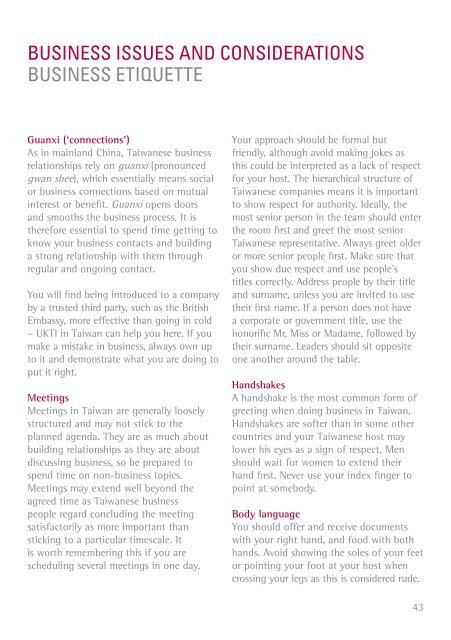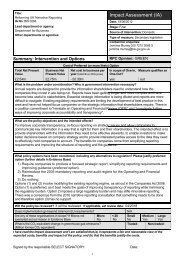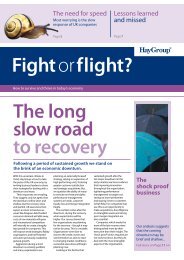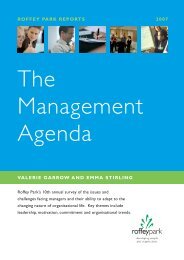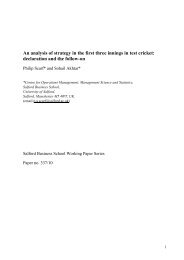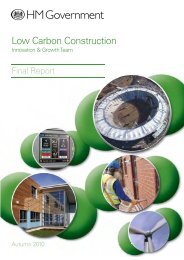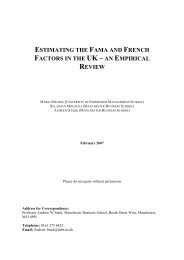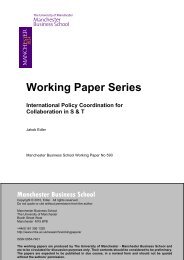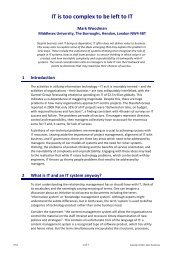Taiwan Business Guide - Management and Business Studies Portal
Taiwan Business Guide - Management and Business Studies Portal
Taiwan Business Guide - Management and Business Studies Portal
Create successful ePaper yourself
Turn your PDF publications into a flip-book with our unique Google optimized e-Paper software.
<strong>Business</strong> Issues <strong>and</strong> Considerations<br />
<strong>Business</strong> etiquette<br />
Guanxi (‘connections’)<br />
As in mainl<strong>and</strong> China, <strong>Taiwan</strong>ese business<br />
relationships rely on guanxi (pronounced<br />
gwan shee), which essentially means social<br />
or business connections based on mutual<br />
interest or benefit. Guanxi opens doors<br />
<strong>and</strong> smooths the business process. It is<br />
therefore essential to spend time getting to<br />
know your business contacts <strong>and</strong> building<br />
a strong relationship with them through<br />
regular <strong>and</strong> ongoing contact.<br />
You will find being introduced to a company<br />
by a trusted third party, such as the British<br />
Embassy, more effective than going in cold<br />
– UKTI in <strong>Taiwan</strong> can help you here. If you<br />
make a mistake in business, always own up<br />
to it <strong>and</strong> demonstrate what you are doing to<br />
put it right.<br />
Meetings<br />
Meetings in <strong>Taiwan</strong> are generally loosely<br />
structured <strong>and</strong> may not stick to the<br />
planned agenda. They are as much about<br />
building relationships as they are about<br />
discussing business, so be prepared to<br />
spend time on non-business topics.<br />
Meetings may extend well beyond the<br />
agreed time as <strong>Taiwan</strong>ese business<br />
people regard concluding the meeting<br />
satisfactorily as more important than<br />
sticking to a particular timescale. It<br />
is worth remembering this if you are<br />
scheduling several meetings in one day.<br />
Your approach should be formal but<br />
friendly, although avoid making jokes as<br />
this could be interpreted as a lack of respect<br />
for your host. The hierarchical structure of<br />
<strong>Taiwan</strong>ese companies means it is important<br />
to show respect for authority. Ideally, the<br />
most senior person in the team should enter<br />
the room first <strong>and</strong> greet the most senior<br />
<strong>Taiwan</strong>ese representative. Always greet older<br />
or more senior people first. Make sure that<br />
you show due respect <strong>and</strong> use people’s<br />
titles correctly. Address people by their title<br />
<strong>and</strong> surname, unless you are invited to use<br />
their first name. If a person does not have<br />
a corporate or government title, use the<br />
honorific Mr, Miss or Madame, followed by<br />
their surname. Leaders should sit opposite<br />
one another around the table.<br />
H<strong>and</strong>shakes<br />
A h<strong>and</strong>shake is the most common form of<br />
greeting when doing business in <strong>Taiwan</strong>.<br />
H<strong>and</strong>shakes are softer than in some other<br />
countries <strong>and</strong> your <strong>Taiwan</strong>ese host may<br />
lower his eyes as a sign of respect. Men<br />
should wait for women to extend their<br />
h<strong>and</strong> first. Never use your index finger to<br />
point at somebody.<br />
Body language<br />
You should offer <strong>and</strong> receive documents<br />
with your right h<strong>and</strong>, <strong>and</strong> food with both<br />
h<strong>and</strong>s. Avoid showing the soles of your feet<br />
or pointing your foot at your host when<br />
crossing your legs as this is considered rude.<br />
43


